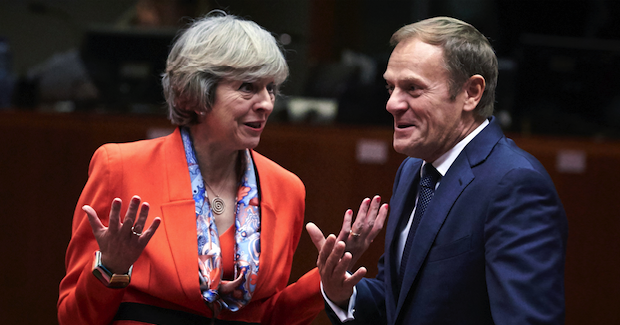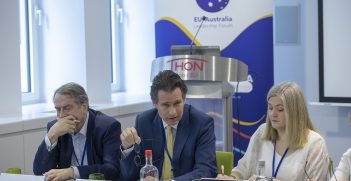Too Soon to Call Brexit Victory?

Theresa May’s recent success in the sympathetic UK House of Commons was hardly ever in doubt but Brexiteers may be congratulating themselves too early. Far more trying obstacles lie ahead; Theresa May will face progressively stronger resistance over the next two years and evidence is mounting that the movement may have been too hasty.
The triumphant celebrations of Theresa May’s Brexiteer ministers after passing—without amendment—the bill authorising her to commence Brexit negotiations were reminiscent of the on-pitch scene when the Wallabies score their first try.
It is, however, only the first try, or the first test if you prefer the cricket analogy. We should remember that Brexit isn’t Brexit until the series is completed. Not only is that a long way off, but there are also many games ahead that could be lost.
The next test begins 20 February when the bill authorising the prime minister to trigger Article 50—commencing two year’s notice of the UK’s intention to end its 43-year membership of the European Union—reaches the House of Lords. Surely, you ask, 805 unelected peers cannot stand in the way of both an overwhelming Commons vote, and a 52 to 48 per cent referendum?
Probably not. But their lordships will not be as supine as colleagues in the Commons, many discarding long-held beliefs for party unity, or more likely, for fear of losing their seats or pre-selection ahead of the next election.
Those who sit in the Lords may not be elected, but the time they give to examining bills is far greater than that expended by the red-benchers in Canberra and most other Westminster-style upper houses. More pointedly, the Conservative government does not have a majority in a chamber where the vast majority voted against Brexit. The Tories, with 252 seats, are outnumbered by 203 Labour members, 102 Liberal-Democrats, and 178 crossbenchers.
The Lords could well spend a week or two debating and passing amendments, which would force the legislation back into the Commons, forcing the government either to accept them or face further obstruction in the upper house.
Then comes the sternest test—the negotiation. The rest of 2017 will be purgatory, with big distractions inhibiting progress. The first will be France’s two-stage presidential election on 23 April.
Not long ago it seemed Theresa May could be looking forward to meeting the centre-right Francois Fallon in the Elysee Palace. But his campaign squibbed after Le Canard claimed he’d used public money to pay his wife €500,000 (AU$688,000) over eight years for a non-existent job.
Now another conservative, possibly Emmanuel Macron, will confront the rising challenge of the far-right Marine Le Pen. It is possible, even likely, Le Pen will make it to the final round for a bruising battle with the left’s Benoit Hamon, who already has the Socialist Alliance’s ticket.
By the time we have a new French government, it will be European summer holidays, and then, in September, Germany’s election. We cannot assume Angela Merkel will survive as chancellor with her coalition partner, the Social Democrats, now under the new leadership of former chairman of the European Parliament Martin Schulz, ahead in the polls.
All this means the British prime minister will face the October Conservative Party conference with little tangible progress. After opening salvos EU chief negotiator, Michael Barnier, a former French politician and deputy head of the European Commission, will, as a stickler for process, dig in and play tough.
Running in parallel will be continued debate over NATO’s future. US President Donald Trump reinforced the demand this week by Secretary of Defense Jim Mattis for EU countries to contribute more and abandon plans for an army. Both demands will be fiercely resisted through the election hiatus.
Meanwhile, Brexit cheerleaders will continue their merry way. Like a middle-aged romantic reconnecting with past girlfriends, UK Secretary of International Trade Liam Fox will traverse the world talking up trade deals with Australia, New Zealand, Southeast Asia, South Africa and Canada. Knowing he is powerless to deal, his international hosts will give him the polite brush-off.
It is starting to dawn on British voters they are not getting what they thought they voted for. Living costs are rising sharply as a 20 per cent fall in the value of the pound sterling since the referendum takes its toll. It’s not just the plunging currency—the price of potatoes is up 30 per cent because the Polish pickers went home, while lettuces have to be imported from the US.
It’s also clear Brexiteer claims of ‘getting back control’ are misleading. The government’s White Paper states: “The sovereignty of Parliament is a fundamental principle of the UK constitution. Whilst Parliament has remained sovereign throughout our membership of the EU, it has not always felt like that.”
Whose fault is that?
The same document also reveals delays before full control of immigration is achieved—the prime reason for the Brexit referendum majority. Suggestions immigrants from EU countries have taken British jobs have been shown to be false, as has the lie that migrants are dole bludgers. Britain will continue to need skilled migrants—to keep its hospitals and NHS operating, its farms producing food, its transport and hospitality industry functioning.
Just published figures show 93 per cent of those on welfare are British nationals. Only one third of Britain’s migrants come from EU countries. Two thirds of immigrants already have jobs and pay taxes, largely accounting for strong recent British growth. And unemployment in Britain is now at 4.8 per cent, the lowest for a decade, despite a record number of immigrants.
How ironic the Brexiteers would claim that as their victory, when it was the increase in migration that created it.
Colin Chapman is a writer, broadcaster and public speaker; he specialises in geopolitics, international economics and global media issues. He is also the immediate past president of the AIIA in NSW.
This article is published under a Creative Commons Licence and may be republished with attribution.





